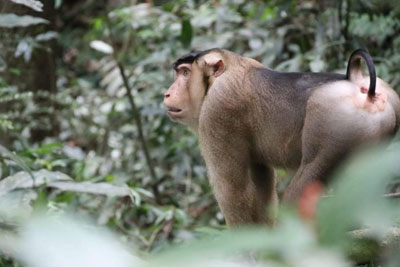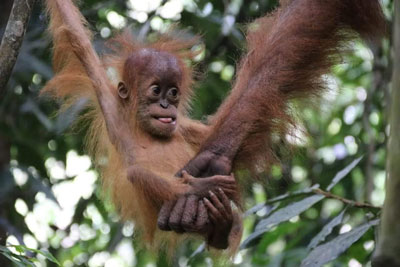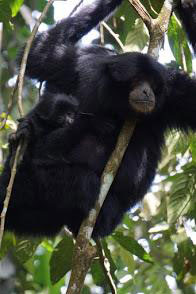

-
The primary goal of our tours and treks is to support conservation.
-
We are ecological specialists with high moral standards.
-
Our head guide has over 30 years of experience.
-
Our team includes an academic orangutan researcher with over 20 years experience in Indonesia.
-
We can arrange a variety of wildlife focused sustainable and responsibly-led expeditions across the island of Sumatra.
Seeing animals in their natural habitats makes for the best kind of wildlife experiences. However, as with any wild animal observational experiences we cannot guarantee that you will see the animals that you want, when you want!
What we can guarantee you is that we will use our expert knowledge and guides to take you to the areas we know you will have the best chance of an encounter.
We pride ourselves on our high moral standards and guarantee sustainable, responsible tours taking you away from the back-packer crowds to paths less trodden.
Our head guide, Wanda has over 25 years of experience offering wildlife treks in Sumatra and we have an extensive network of colleagues from the world of academic research with the very best naturalist experts across Sumatra. Our tours focus on North Sumatra and South Aceh, which are renowned for having the largest remaining wild populations of Sumatran orangutans, tigers, rhinos and bears.
Why are our tours so special?

- 100% sightings of wild orangutans away from crowds
- Led by expert naturalist guides
- Limited numbers of tourists per group
- Up-to-date information sharing on fauna and flora sightings
- Outings at the best times of the day and night
- Night and day treks
- Visits to area with the highest density of wild orangutans
- Adherence to the IUCN Best Practice Guidelines for Great Ape Tourism
Responsible Tours
Tourism poses a risk to wild animals and in particular to the great apes. Therefore, to ensure the safe keeping of our guests and the wildlife we encounter we ask that you are fully vaccinated against the following diseases before your trip;
polio, tetanus, measles, mumps, rubella, hepatitis A and B, meningococcal meningitis, typhoid, tuberculosis.
The forests around Sumatra are home to the last few remaining Sumatran orangutans. These animals are critically endangered. In addition to those travel vaccinations listed above, on your arrival in Sumatra and before your trek, we ask that you do not participate if you have experienced any of the following symptoms within the previous 48 hours of your tour;
sneezing, coughing, fever, diarrhoea.
Concealing any of these symptoms puts all wildlife at considerable risk. Please speak to us before your trip if you have any concerns.

During any trek we expect our guides and guests to follow these rules;
-
No food or drink to be consumed or visible during observations of wild animals.
-
Food waste and all other rubbish should be stowed in backpacks and carried out of the forest to prevent deposition of infectious waste in the habitat.
-
Food must never be used to attract or feed apes.
-
For visitors not wearing N95 surgical masks, the minimum permitted distance is 10 metres (33 feet). If wearing a mask, the minimum distance is 7 metres (22 feet).
-
Guests should spend no longer than one hour near wild animals.
-
Tips to guides should not be offered to bend or break these guidelines.
Macfie, E.J. & Williamson, E.A. (2010). Best Practice Guidelines for Great Ape Tourism. IUCN/SSC Primate Specialist Group, Gland, Switzerland.
The Foreign and Commonwealth Office (FCO) provide the latest travel advice by country including safety and security, entry requirements, travel warnings and health. For the latest FCO advice please refer to the FCO website. Current travel health information can be found by visiting www.travelhealthpro.org.uk a resource set up by the Department of Health. The advice can change on all sites so please check regularly for updates.